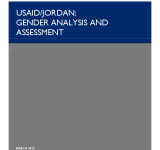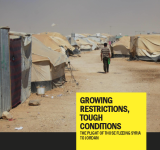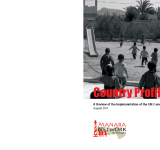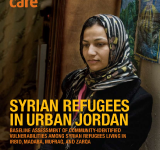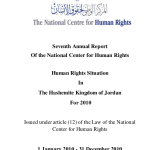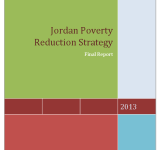The report presents an up-to-date analysis of gender disparities in Jordan to inform development assistance programs by the USAID for the 2013-2017 strategic plan. The assessment report is prepared by the Global Health Technical Assistance Project;; funded by USAID Jordan and therefore;; it is based on a literature review and field work of the 21 focus group discussions held in Amman;; Irbid;; Tafileh and Zarqa. The report establishes that Jordan has begun to transition to a knowledge-based economy with the national advantage as its people. It also points out that despite the investments that have helped address gender equality issues;; Jordan continues to bear low female participation in the labor markets;; gender stereotypes about the role of females and males and conservative cultural norms. The report includes a sector-by-sector analysis;; recommendations;; gender review and an illustrative implementation plan. It concludes with key recommendations on the wide breadth of the USAID Jordan portfolio with a key emphasis on gender issues.
وحقوق الإنسان
This report addressed CEDAW Committee by providing a solid and up-to-date information set and analysis of positive policies and legislation taken for women’s advancement and weaknesses that are delaying progress and sustaining disparities. The report covers six components: 1. Jordan’s reservations on CEDAW;; 2. Harmonization of CEDAW into legislation;; 3. Political representation;; 4. Violent against women;; 5. Equal rights in the family;; 6. Conditions of vulnerable and marginalized women. It also provides an overall assessment of the six components covering 3 areas: assessment of the official efforts towards the implementation of CEDAW;; also;; assessment of the civil society efforts and strategies towards monitoring Jordan’s commitment to obligations;; and suggested recommendations for the new concluding observations.
يستند مضمون هذا التقرير المتعلق بالأردن إلى حد كبير إلى زيارة بحثية قامت بها منظمة العفو الدولية إلى البلاد في يونيو/حزيران 2013. وقد التقى وفد المنظمة بممثلي السلطات الأردنية ووكالات الأمم المتحدة والوكالات الإنسانية الدولية والمنظمات غير الحكومية والجمعيات الخيرية;; فضلاً عن أكثر من 150 لاجئاً من سوريا في مجتمعات اللجوء والمجتمعات المضيفة. ونشرت منظمة العفو الدولية هذا التقرير بهدف لفت الانتباه إلى الصعوبات التي يواجهها الفارون من سوريا طلباً للسلامة. وفي الوقت الذي يركز فيه التقرير بشكل رئييس على الأوضاع في الأردن;; فإنه يتضمن تحديثا للمعلومات التي كانت المنظمة قد نشرتها في السابق بشأن التحديات التي يواجهها اللالجئون من سوريا في البلدان المجاورة. وقد أمعنت منظمة العفو الدولية النظر في التحديات التي يواجهها اللاجئون في الأردن;; ولا سيما أولئك الذين يقطنون في مخيم الزعتري;; وهو أضخم مخيمات اللاجئين من سوريا في الأردن. وأجرت المنظمة تحقيقاً حول معاناة اللاجئين;; ليس من ظروف المعيشة القاسية في الصحراء فحسب;; وإنما أيضاً من ارتفاع معدلات الجريمة وغيرها من المخاوف الأمنية.
The country profile component of the Manara project is a rigorous and exhaustive report on the status of the implementation of the Convention on the Rights of the Child. It aims to be a resource for identifying gaps and challenges on the status of the implementation of the Convention;; to highlight the recommendations of the Committee on the Rights of the Child on specific matters;; and to identify commendable practices implemented by the State;; civil society and the international community in addressing these issues. The information was collected by exhaustive literature review and followed by field research involving a series of interviews with identified stakeholders;; government ministries and institutions;; local and INGOs;; academics;; unions and professional associations;; media;; religious authorities and United Nations agencies were contacted and interviewed. The structure of the study is based on the following themes: human rights;; children’s rights;; child labor and violence against children
This report is a baseline assessment of community-identified vulnerabilities among Syrian refugees living in Amman;; Irbid;; Madaba;; Mufraq;; and Zarqa. The purpose of this report is to identify urban Syrian refugees’ current coping mechanisms and any gaps in services available to Syrian refugees in Jordan. The research methodology is both qualitative and participatory in design;; drawing from the UNHCR tool for Participatory Assessment in Operations. This report presents only the data from household interviews;; baseline assessment;; and the follow-up focus groups conducted with community members. The number of households surveyed was 240;; with a total number of 1;;476 household members and 89 focus group participants representing 534 household members. The report proposed general recommendations and interventions to deal with the main highlighted challenges (cash assistance;; strengthening community links;; vocational training;; physical activities ...etc).
This annual report comes to diagnose the situation of human rights in the Hashemite Kingdom of Jordan in 2010;; and to point out the positive or negative changes that have occurred during that period. The report comprises the outcome of the accumulated experiences of the Center in the field of protecting civil;; political;; economic;; social and cultural rights. It also comprises a qualitative addition represented in the devotion of an axis related to the assessment of how serious the Government is in taking appropriate legislative;; judicial and executive measures needed to implement the recommendations by the treaty committees. The main themes are: Civil and Political Rights;; Economic;; Social and Cultural Rights;; Women's Rights;; Child Rights;; Rights of Persons with Disability;; Rights of the Elderly. The report proposes legislations;; policies and measures that are believed to contribute to changing the current situation of Human Rights for the better;; especially in the light of the rapid developments taking place in the Arab region.
The Government of Jordan adopted its first Poverty Alleviation Strategy in 2002 recognizing poverty as a key development problem requiring a comprehensive policy for improving the lives of the poor and socially excluded;; increasing their human capabilities;; providing them with economic opportunities and fully integrating them in the society. Considerable progress in poverty reduction has been achieved. The Government has put in place a series of social programs aimed at increasing employment opportunities;; curbing unemployment;; combating poverty and offering in-kind and cash assistance for the poor and marginalized groups within Jordanian society
